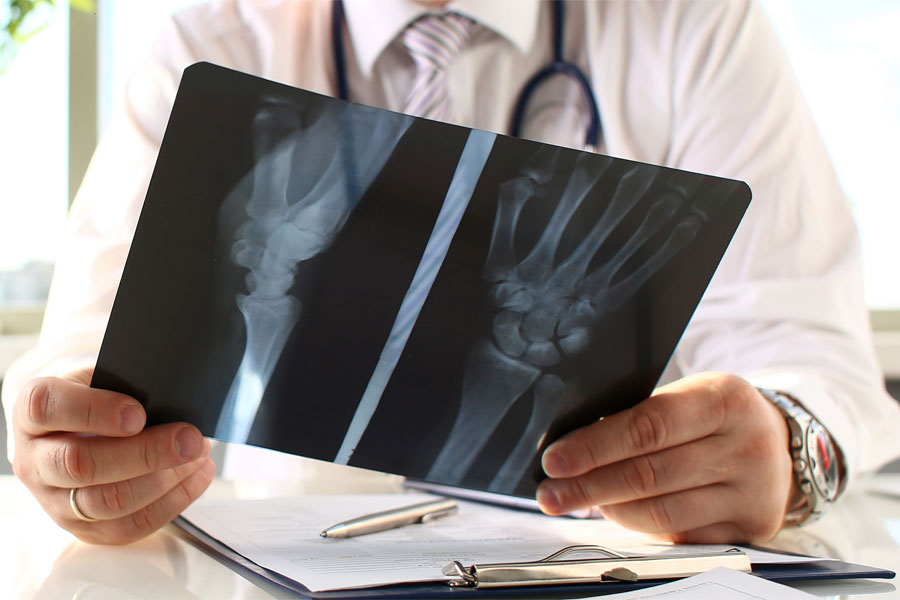In the human body, there are over 300 bones, joints, muscles, ligaments, and tendons that work together so we can move and function properly. If just one of these areas is not working the way it should, you can experience varying pain or discomfort, which can affect your quality of life. An orthopedic doctor specializes in the bones and joints, and they can diagnose and treat a variety of ailments. Knowing when it is necessary to see an orthopedic specialist is not always easy. Mattalino Orthopaedic in Phoenix, AZ is available to answer your questions.
What Does an Orthopedic Doctor Do?
Many people struggle with aching bones, joints, or muscle pain. Whether you have a congenital musculoskeletal condition or are recovering from a severe injury, seeking a specialist can be beneficial. An orthopedic doctor, or orthopedist, is a physician trained in the musculoskeletal system. The musculoskeletal system includes the bones, joints, ligaments, tendons, and muscles in our bodies.
Orthopedic specialists can use surgical and non-surgical treatments to customize a treatment plan that works best for each patient. They specialize in preventing, diagnosing, and treating disorders in the musculoskeletal system, and they can oversee the treatments and rehabilitation process for injuries to these areas.
What Does an Orthopedic Doctor Treat?
- Back pain from ruptured disks and spinal stenosis
- Carpal tunnel syndrome, arthritis in the hands, and hand injuries
- Achilles tendon injuries, bunions, and injuries to the foot and ankle
- Club foot, bowlegs, and hip dysplasia
- Orthopedic trauma and sports injuries
- Bone tumors
- Osteoporosis
- Arthritis
Types of Orthopedic Treatment Options Available
Doctors can customize a treatment plan based on the needs and medical restrictions of the patient because there are different treatment options available. These treatment options include surgical and non-surgical treatments, both of which help ease a variety of musculoskeletal issues.
Non-Surgical Treatments
Non-surgical treatments are most often preferred for those with less serious health issues because they are cost-effective and do not require lengthy recovery time.
Braces and Casts
Braces and casts are a simple and painless solution. The doctor will apply a plaster cast or removable brace to the affected area to help reduce the amount of pressure applied to a muscle, bone, or joint so the fracture or inflammation can adequately heal.
Exercise or Physical Therapy
Exercise or physical therapy is an excellent noninvasive treatment that helps to improve flexibility, mobility, and muscular strength and endurance throughout the body. It is a great way to help prevent future injuries that resulted from weakness in the muscles or joints.
Injections
Injections, including hyaluronic acid or steroids, are an effective, noninvasive form of treatment that doctors recommend most often in pain management or lubricating the joints.
Surgical Treatments
Surgical treatments are effective forms of treatment for more severe health issues. There is necessary recovery time, but the results will be longer-lasting, or even permanent compared to non-surgical options.
Amputation
If a patient has a bodily extremity that is severely damaged, the doctor must surgically remove it from the body to prevent other health issues.
Arthroscopy
Arthroscopy is a minor procedure looking inside a joint to see the condition of cartilage and ligaments. Orthopedic doctors use this treatment to find inflammation and injuries, and they also use it to perform some minor surgeries.
Cartilage Repair
When one experiences an injury or trauma to a joint, and this injury or trauma damages the existing cartilage, orthopedic specialists will repair the damage, allowing for new cartilage to grow. Cartilage repair is usually a minor arthroscopic treatment to remove the damaged cartilage and create holes in the nearby bone to stimulate the natural healing response in the body by creating new cartilage.
Joint Replacement
For patients who have joints that are not working correctly because of arthritis or other health conditions. Orthopedic doctors can replace parts of the joint with an artificial device made from metal, plastic, or ceramics. Doctors recommend this treatment option for those needing knee and hip replacements.
Signs You Should See an Orthopedic Doctor
People most often seek treatment from a specialist when they want to correct a serious “life or death” problem. However, an orthopedic doctor is also interested in increasing the quality of life of patients who struggle with pain and mobility issues. If you have been experiencing pain, stiffness, warmth, or swelling in your joints for at least three days or on at least two different occasions in the same month, it is time to consult with a professional.
You may see your primary healthcare provider for a referral, especially if you have an HMO insurance plan. If your primary healthcare provider believes that you may have arthritis, they may recommend seeing a rheumatologist or a specific orthopedic doctor. Listed below are five signs you should see an orthopedic specialist.
1. You Have Difficulty Performing Day-to-Day Activities
Are your daily activities getting more challenging because of muscle or joint pain or stiffness anywhere on your body? Repetitive motion can lead to health conditions, including carpal tunnel syndrome, tendinitis, and plantar fasciitis. If you notice that you are having difficulty in routine activities because of pain or stiffness that does not subside for 48 hours, please contact an orthopedic specialist.
2. You Suffer From Chronic Pain
Feeling muscle and joint pain occasionally can be normal because of the wear and tear on our bodies, but if you experience pain or discomfort every day, this could be a sign of something more serious. If you are experiencing pain every day or are experiencing extreme pain, please contact an orthopedic specialist.
3. Your Motor Skills or Range of Motion Are Limited
When there is pain, stiffness, or discomfort in your muscles, joints, etc. it makes it difficult for our bodies to function with a full range of motion. You may find that you cannot lift your arms as high, your walking stride may be shorter than normal, or you may find you cannot move your head, neck, hips, or back as quickly as you had done before. You may see results with the surgical or non-surgical treatments a specialist can provide.
4. You Experience Instability While Standing or Walking
Do you experience pain, stiffness, or discomfort in your feet, legs, or hips? If you answered “yes,” does this make it challenging to keep your balance as you stand or walk? If so, contact an orthopedic specialist today to see what they can do to help.
5. You Have Suffered a Soft Tissue Injury
Have you experienced a soft tissue injury, including a sprained ankle, a twisted knee, or wrist injury? Have you not seen improvement in 48 hours? If you answered “yes” to both questions, there could be a more severe health issue, and it is best to contact an orthopedic specialist for diagnosis and treatment.
How to Determine Which Orthopedic Specialist to See
It is essential, and often complicated and time-consuming, to determine who is the right orthopedic specialist to see. Each patient has different needs, and doctors have advanced training but different specialties and personalities. Your primary healthcare provider may be a great place to start because they know your medical history and may help refer you to a specialist that can best treat your problems.
Ultimately, you need to be comfortable with the specialist you work with because you need to feel comfortable enough to communicate with them, and you may need to see them multiple times. So what steps do you take to determine which orthopedic specialist to see?
Seek Referrals
Seeking a personal or professional referral is the number one step to take for finding the right medical professional for any service. If your doctor cannot recommend a specialist, you may have a family member or close friend that has received treatment from a specialist they trust and can recommend based on your needs.
Inquire With Your Insurance Company
A practical, cost-effective approach to finding a specialist is talking to your insurance provider to find specialists in your area that take your insurance. Most insurance providers provide a list of qualified doctors, specialists, and hospitals that take part in their plan, or you can call them and speak to a member services representative.
You may also contact the clinics directly and talk to a customer service representative to see if your insurance is acceptable and what services your insurance would cover. Many clinics can offer financing so you can get the best treatment even if that clinic isn’t in your insurance network.
Research Specialist Credentials
For your health and well-being, it is best not to find a specialist by word of mouth alone. You will want to look up the orthopedic specialist to review their credentials. Some clinics or medical boards will provide details about their specialists online.
You can review their curriculum vitae (CV), for example, which includes the training they have received, the certifications they have earned, when their certifications expire, where they studied, and any awards they have won based on the quality of their work in the field and their service to their clients. You can also determine their level of experience by looking at credentials.
Who Do You Feel Comfortable Working With?
Depending on the pain you are experiencing and the treatment you may need, it is essential that you feel comfortable being around them, talking to them, and having them work on you; which includes touching the injured area on your body. For some people, it isn’t an issue and they can work with anyone.
For others, choosing the right person is essential for comfort. Some women, for example, may only want to seek treatment from a female doctor, and men may prefer to seek treatment by a male doctor.
Other factors that may influence a person’s decision for their comfort may include ethnicity, personality, and age. Some factors can affect a person’s decisions that are not specific to the doctor’s characteristics, including the location and cleanliness of a facility, the knowledge and friendliness of their staff, and the cost of the service. If you need to find someone you are comfortable with, you need to know who makes you comfortable or what factors you want to avoid, if possible.
See an Orthopedic Doctor Today!
Have you been experiencing pain or discomfort in your bones, joints, or muscles? Do you have questions about orthopedic treatment and what it can do for you? Do you want to find a highly referred specialist that will provide high quality, cost-effective, and friendly service with proven results? The specialists at Mattalino Orthopaedic are knowledgeable and committed to helping ease your pain so you can live your best life. Call Mattalino Orthopaedic in Phoenix, AZ today, to schedule your consultation!
Give us a call so we can work out whatever financing concerns or personal preferences for treatment you may have. Our goal is to make you comfortable and get you feeling great again.


